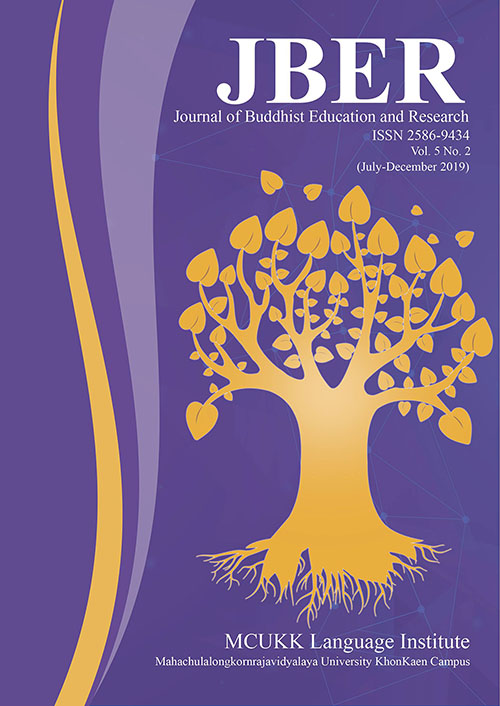THE MANAGEMENT OF PARTICIPATORY LEARNING ACTIVITY BASED ON THE THREEFOLD TRAINING BY ADOPTING THE PHILOSOPHY OF SUFFICIENCY ECONOMY TO PROMOTE SUSTAINABLE EDUCATIONAL MANAGEMENT IN SCHOOLS UNDER NONG SAMRONG MUNICIPALITY, UDON THANI PROVINCE
Keywords:
Participation, the Threefold Learning, Philosophy of Sufficiency Economy.Abstract
The aims of this research were: to study the basic information, to opinion compare and to study the ways of participatory learning activity management based on the threefold learning (tisikkhā) by adopting the philosophy of sufficiency economy to promote sustainable education management in schools under Nong Samrong municipality, Udon Thani province. The population of this research included 132 of educational personnel and students in schools under the municipality and the research targets were 20 of those. The data were collected by using a questionnaire and an interview form. The statistics such as Frequency, Percentage, Mean and Standard Deviation were used in the data analysis.
The research results were as follows:
- In overall, the management of participatory learning activity based on the threefold learning by adopting the philosophy of sufficiency economy to promote sustainable educational management in schools under Nong Samrong municipality, Udon Thani province was statistically rated at the highest level with its mean score of 4.69. In studied aspect consideration, the highest statistic score was found in that of the management of participatory learning activity based on the threefold learning by adopting the philosophy of sufficiency economy to promote sustainable educational management in schools, followed by that of the participatory learning activity management based on the threefold learning, the participatory learning activity management, integration of the philosophy of sufficiency economy in managing learning activities
- The pair comparison results revealed that the scores of the management of participatory learning activity based on the threefold learning by adopting the philosophy of sufficiency economy to promote sustainable education management in schools under Nong Samrong municipality, Udon Thani province showed differences in all studied aspects with the statistical significance level of .05; this accepted the prior set hypothesis.
- The ways of management of participatory learning activity based on the threefold learning in overall are that the threefold learning and integration of the philosophy of sufficiency economy should be applied into all learning subject areas and all school activities to promote the potential of participation and sustainable education management.
References
บุญธรรม กิจปรีดาบริสุทธิ์. (2549). ระเบียบวิธีการวิจัยทางสังคมศาสตร์. พิมพ์ครั้งที่ 9. กรุงเทพฯ: จามจุรโปรดักท์.
พระเทพโสภณ (ประยูร ธมฺมจิตฺโต). (2547). โรงเรียนวิถีพุทธ. กรุงเทพมหานคร : โรงพิมพ์มหาจุฬาลงกรณราชวิทยาลัย.
พระบาทสมเด็จพระเจ้าอยู่หัว รัชกาลที่ 9, ปรัชญาของเศรษฐกิจพอเพียง, พระราชดำรัสโดยย่อเกี่ยวกับเศรษฐกิจพอเพียงในวันพระราชพิธีฉลองสิริราชสมบัติครบ 60 ปี, 10 มิถุนายน พุทธศักราช 2549. สืบค้นเมื่อ 15 มิถุนายน 2561 จาก https://www.chaipat.or.th/site_content/item/3579-2010-10-08-05-24-39.html.
พระพรหมคุณาภรณ์ (ป.อ.ปยุตฺโต). (2551). พัฒนาสังคมไทยสู่วัฒนธรรมแห่งความใฝ่รู้และสู้สิ่งยาก. หนังสือพิมพ์มติชนรายวัน, น. 10.
พระรัชเวธน์ เตชวณฺโณ (รุ่งเรือง). (2558). การจัดการเรียนรู้ ตามหลักไตรสิกขาในโรงเรียนทีปังกรวิทยาพัฒน์ (ทวีวัฒนา) ในพระราชูปถัมภ์ฯ สังกัดสำนักงานเขตพื้นที่การศึกษามัธยมศึกษา เขต 1 กรุงเทพมหานคร. วิทยานิพนธ์พุทธศาสตรมหาบัณฑิต. บัณฑิตวิทยาลัย : มหาวิทยาลัยมหาจุฬาลงกรณราชวิทยาลัย.
วิสูตร ชลนิธี และคณะ. (2558). กลยุทธ์การพัฒนาคุณภาพผู้เรียนตามหลักไตรสิกขาของโรงเรียนบ้านสะพานสี่ อำเภอปลวกแดง จังหวัดระยอง. วารสารวิจัยและพัฒนา วไลยอลงกรณ์ ในพระบรมราชูปถัมภ์ สาขามนุษยศาสตร์และสังคมศาสตร์. 10(3), 303-316.
ศรประภา พงษ์หัตถาศิลป์. (2558). การบริหารสถานศึกษาตามหลักปรัชญาของเศรษฐกิจพอเพียงในโรงเรียนสังกัดเขตพื้นที่สำนักงานการศึกษาประถมศึกษาสมุทรสาคร. วิทยานิพนธ์การศึกษามหาบัณฑิต. บัณฑิตวิทยาลัย : มหาวิทยาลัยศรีนครินวิโรฒ
สถานศึกษาในสังกัดเทศบาลเมืองหนองสำโรง. ข้อมูลสถานศึกษา. สืบค้นเมื่อ 21 มกราคม 2560 จาก https://th.wikipedia.org/wiki/สำนักงานเทศบาลเมืองหนองสำโรง.
Krejcie, R. V. & Morgan, D. W. (1970). Determining Sample Size for Research Activities.Educational and Psychological Measurement, 30(3), 707-710.





